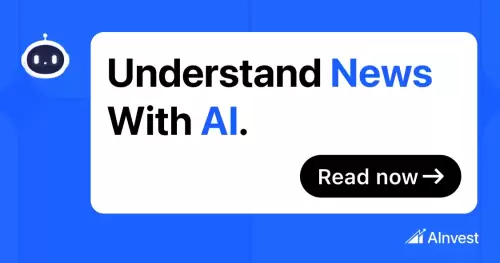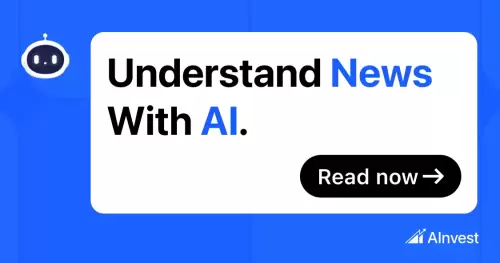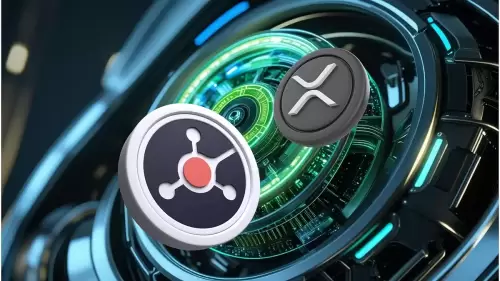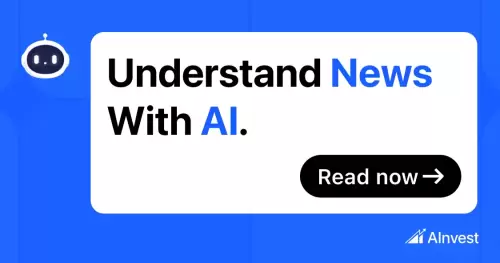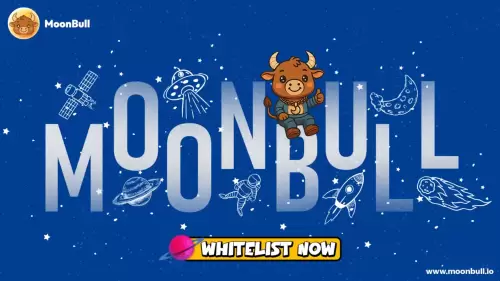 |
|
 |
|
 |
|
 |
|
 |
|
 |
|
 |
|
 |
|
 |
|
 |
|
 |
|
 |
|
 |
|
 |
|
 |
|
Cryptocurrency News Articles
Agents of change: How blockchain makes AI-powered games truly social
Jun 12, 2025 at 11:26 pm
Many people still don't see the point of using blockchain in games. It's a powerful tool that drives ownership and trading
Many people still don’t see the point of using blockchain in games. It’s a powerful tool that drives ownership and trading but is not vital for most gameplay types.
The rise of AI shifts the equation. Blockchain isn’t just a bonus feature for games enhanced with artificial intelligence — it’s critical for building consistent gameplay. Fast processors and cloud servers are not enough anymore. AI agents and players need blockchain to enable a truly social gaming experience, where achievements can be recorded and carried across different titles, turning games into connected social ecosystems. Without decentralized infrastructure, agentic gameplay risks becoming a centralized walled garden where progress is temporary, creations are locked in, and experience is limited.
Disposable creations
Today’s AI can build a personalized game flow as it learns and adapts in real time. But when AI runs within a centralized entity, its creations remain disposable, owned and monetized by corporations.
Player interactions are stored privately on corporate servers. Memories and evolving character relationships die if the server shuts down. Game progress, AI agent evolution and generated content are tied to the lifecycle of a game session, account or corporate policy. If a player restarts the game or a publisher pulls the plug, all creations and achievements risk going in vain. When AI agents forget what they did yesterday, emerging storylines can’t unfold consistently, and NPCs don’t get smarter.
If the user owned at least part of the generated content, this could solve the problem, but the centralized nature of games doesn’t permit this either.
Here’s another important thing: When AI adapts to the player, they become co-creators of the game. They build new characters, stories and items, but gamers can’t benefit from their own creations. Creativity gets exploited when players can’t capitalize on their contributions.
Memory, ownership and monetization
Blockchain is a natural fit to extend AI’s memory and grant users ownership of their creations.
A distributed ledger can record game contents onchain, including player actions and achievements. Most AI agents today operate within a single session: They don’t remember past interactions once the session ends. If the game progress records are on the blockchain, nothing gets lost. Agents can learn and evolve from session to session. This opens the way to consistent narratives and character arcs.
When AI’s progress is recorded onchain, it is stored in users’ wallets, so players own and control their history — it’s not lost or locked away. Besides the memory benefits for agentic AI, ownership opens broad opportunities for managing in-game assets.
The problem with traditional games is that gamers rent, not own, things — everything remains under the game publisher’s control. If a player spends years shaping an AI companion or a unique item, that asset dies inside that game. It cannot be transferred to other games or platforms. It’s trapped.
Recent: Crypto gaming interest drops in April, overall ecosystem healthier: DappRadar
When AI is backed by blockchain, any generated item can be minted as an NFT and stay in the player’s wallet forever. No one will ever delete it or restrict user access to it: NFTs are stored in a decentralized manner. And this is for their safekeeping and utility, not speculation.
Users can transfer their assets beyond a single title across virtual worlds. When blockchain preserves memory and traits, items and even NPCs carry a consistent identity wherever they go.
Games become a unified social ecosystem. Players can compare what they’ve built, show off their achievements with AI, and appreciate others’ journeys. Social dynamics evolve around provable creativity, history and shared experiences, not simply leaderboards or loot boxes. That keeps players coming back — not just playing, but connecting.
Is it cost-efficient to store so much data onchain, though? Layer-2 and Layer-3 platforms have dramatically advanced over the past few years. They’ve become fast and cheap enough to handle thousands of transactions per second at a nearly invisible cost. Robust infrastructure has made it possible to store large amounts of data. Today’s blockchains can easily handle AI data accumulation for as many users as needed.
Finally, asset ownership opens monetization opportunities. When crafted carefully, they enhance the gameplay, not replace it, like in early play-to-earn products.
AI agents will forge unique items and mint them as NFTs, giving rise to in-game marketplaces woven directly into gameplay. Agents will seek the best trades and autonomously execute them. Players will enjoy playing, skipping most of the technical friction. They will invest their time, creativity and skill in how they shape assets, characters or storylines together with AI. And when they can license, rent or sell them on open marketplaces, they gain a real sense of agency and reward, turning their contributions into lasting value.
While players monetize what they create, game developers profit, too. They can earn a share of every marketplace transaction, charge fees for minting or customization, and offer premium AI
Disclaimer:info@kdj.com
The information provided is not trading advice. kdj.com does not assume any responsibility for any investments made based on the information provided in this article. Cryptocurrencies are highly volatile and it is highly recommended that you invest with caution after thorough research!
If you believe that the content used on this website infringes your copyright, please contact us immediately (info@kdj.com) and we will delete it promptly.























































